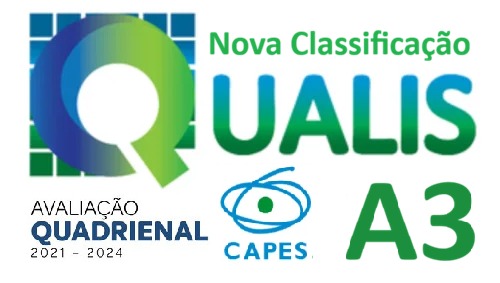Evaluation of mercury levels in hair of children resident in artisanal gold mining area in the city of Chapada de Natividade - Tocantins
DOI:
https://doi.org/10.15392/bjrs.v7i2A.750Palabras clave:
mercury, hair, children, artisanal gold mining, TocantinsResumen
ABSTRACT
The objective of the work is to evaluate the mercury exposure of children living in an artisanal gold mining area and in a control area, without mining. A cross-sectional study was conducted with children living in the municipalities of Chapada de Natividade and Porto Nacional, in the State of Tocantins, where hair samples were collected for laboratorial analysis of mercury concentrations, comparing between municipalities, gender, monthly fish consumption, profession of parents and the presence of amalgam in dental restorations. The hair samples were analyzed by the methods of neutron activation analysis and also by means of the DMA (Direct Mercury Analyzer) equipment, in the last case being a partnership with CETESB. There was no evidence of mercury-related diseases in the studied children. The mean concentration of mercury in children in Chapada de Natividade was significantly higher than in Porto Nacional. Children exposed to artisanal gold mining areas have higher concentrations of mercury than children living in non- artisanal gold mining areas. There was no significant relationship between mercury concentrations and gender, monthly fish consumption, parental profession and amalgam presence in dental restorations. The results suggest that the children living in an area exposed to mining experience greater environmental exposure to mercury, regardless of their eating habits.
Descargas
Referencias
LEE, C.C., CHANG, J. W.; HUANG, H. Y., CHEN, H. L. Factors influencing blood mercury levels of inhabitants living near fishing areas. Science of the Total Environment, v. 424, pp.316-321, 2012.
KHOURY, E. D. T.; SOUZA, G. S.; SILVEIRA, L. C. L.; COSTA, C. A.; ARAÚJO, A. A.; PINHEIRO, M. C. N. Manifestações neurológicas em ribeirinhos de áreas expostas ao mercúrio na Amazônia brasileira. Cadernos de Saúde Pública, n. 29, v.11, pp.2307-2318, 2013.
BOUCHER, O.; JACOBSON, S. W.; PLUSQUELLEC, P.; DEWAILLY, E.; AYOTTE, P.; FORGET-DUBOIS, N.; JACOBSON, J. L.; MUCKLE, G. Prenatal methylmercury, postnatal lead exposure, and evidence of attention deficit/hyperactivity disorder among Inuit Children in Arctic Québec. Environmental Health Perspectives, n. 120, v. 10, pp.1456-146, 2012.
SILVA T. M. Biomonitoramento da exposição humana ao mercúrio (Hg) na população da área de influência do aproveitamento elétrico de Jirau, Bacia do Rio madeira, Estado de Rondônia. Traba-lho de conclusão de curso de Bacharelado de gestão ambiental, Planaltina, DF, Faculdade UnB Planaltina, Universidade de Brasília, 2012.
JAPÃO, Ministério do Meio Ambiente, Manual de Análises de Mercúrio, Tradução Terezinha M. Cid de Souza, 2004.
LEE, R.; MIDDLETON, D.; CALDWELL, K.; DEARWENT, S.; JONES, S.; LEWIS, B.; MON-TEILH, C.; MORTENSEN, M. E.; NICKLE, R.; ORLOFF, K.; REGER, M.; RISHER, J.; ROG-ERS, H. S.; WATTERS, M. A review of events that expose children to elementary mercury in the United States. Environmental Health Perspectives, v. 117, pp.871-878, 2009.
PINHEIRO, M. C. N.; GUIMARÃES, G. A.; NAKANISHI, J.; OIKAWA, T.; VIEIRA, J. L.; QUARESMA, M.; CARDOSO, B.; AMORAS, W. Avaliação da contaminação mercurial mediante análise do teor de Hg total em amostras de cabelo em comunidades ribeirinhas do Tapajós, Pará, Brasil. Revista da Sociedade Brasileira de Medicina Tropical, n. 33, v. 2, pp.181-184, 2000.
PICHERY, C.; BELLANGER, M.; ZMIROU-NAVIER, D.; FRÉRY, N.; CORDIER, S.; ROUE-LEGALI, A.; HARTEMANN, P.; GRANDJEAN, P. Economic evaluation of health consequences of prenatal methylmercury exposure in France. Environmental Health, n. 11, v. 53, pp.1-10, 2012.
IAEA-International Atomic Energy Agency. Reference methods for marine pollution studies. IAEA-MEL-46, Vienna: IAEA, 1987.
USEPA-SW86, Method 7473. Mercury in solids and solutions by thermal decomposition, amalgamation and atomic absorption spectrophotometry, 2007.
NRC-National Research Council. Committee on the toxicological effects of methylmercury. National Academy Press, Washington, DC (2000).
MCDOWELL, M. A.; DILLON, C. F.; OSTERLOH, J.; BOLGER, P. M.; PELLIZZARI, E.; FERNANDO, R.; DE OCA, R. M.; SCHOBER, S. E.; SINKS, T.; JONES, R. L.; MAHAFFEY, K. R. Hair mercury levels in US children and women of childbearing age: reference range data from NAHNES 1999-2000. Environmental Health Perspectives, n. 112, v. 11, pp.1165-1171, 2004.
CASTAÑO, A.; CUTANDA, F.; ESTEBAN, M.; PÄRT, P.; NAVARRO, C.; GÓMEZ, S.; ROSADO, M.; LÓPEZ, A.; LÓPEZ, E.; EXLEY, K.; SCHINDLER, B. K.; GOVARTS, E.; CASTELEYN, L.; KOLOSSA-GEHRING, M.; FIDDICKE, U.; KOCH, H.; ANGERER, J.; HOND, E. D.; SCHOETERS, G.; SEPAI, O.; HORVAT, M.; KNUDSEN, L.E.; AERTS, D.; JOAS, A.; BIOT, P.; JOAS, R.; JIMÉNEZ-GUERRERO, J.A.; DIAZ, G.; PIRARD, C.; KATSONOURI, A.; CERNA, M.; GUTLEB, A. C.; LIGOCKA, D.; REIS, F. M.; BERGLUND, M.; LUPSA, I. R.; HALZLOVÁ, K.; CHARLIER, C.; CULLEN, E.; HADJIPANAYIS, A.; KRSKOVÁ, A.; JUNSEN, J. F.; NIELSEN, J. K.; SCHWEDLER, G.; WILHELM, M.; RUDNAI, P.; KÖZÉPESY, S.; DAVIDSON, F.; FISCHER, M. E.; JANASIK, B.; NAMORADO, S.; GURZAU, A. E.; JAJCAJ, M.; MAZEJ, D.; TRATNIK, D. J. S.; LARSSON, K.; LEHMANN, A.; CRETTAZ, P.; LAVRANOSAND, G.; POSADA, M. Fish consumption patterns and hair mercury levels in children and their mothers in 17 EU countries. Environmental Research, v. 141, pp. 58–68, 2015.
MALM, O.; DÓREA, J. G.; BARBOSA, A. C.; PINTO, F. N.; WELHE, P. Sequential hair mercury in mothers and children from a traditional riverine population of the Rio Tapajós, Amazonia. Environmental Research, n. 110, v. 7, pp.705-709 (2010).
ROCHA, A.V.; CARDOSO, B. R.; COMINETTI, C.; BUENO, R. B.; DE BORTOLI, M. C.; FARIAS, L. A.; FÁVARO, D. I. T.; CAMARGO, L. M. A; COZZOLINO, S. M. F. Selenium sta-tus and hair mercury levels in riverine children from Rondônia, Amazonia. Nutrition, v. 30, pp.1318-1323, 2014.
MONTUORI, P.; JOVER, E.; DIÉZ, S.; RIBAS-FITÓ, N.; SUNYER, J.; TRIASSI, M.; BAYONA, J. M. Mercury speciation in the hair of pre-school children living near a chlor-alkali plant. Science of the Total Environment, v. 369, pp.51-58, 2006.
Descargas
Publicado
Número
Sección
Categorías
Licencia
Derechos de autor 2021 Brazilian Journal of Radiation Sciences (BJRS)

Esta obra está bajo una licencia internacional Creative Commons Atribución 4.0.
Licencia: los artículos de BJRS tienen una licencia internacional Creative Commons Attribution 4.0, que permite el uso, el intercambio, la adaptación, la distribución y la reproducción en cualquier medio o formato, siempre que se otorgue el crédito correspondiente al autor o autores originales y a la fuente, proporcione un enlace a la licencia Creative Commons e indique si se realizaron cambios. Las imágenes u otros materiales de terceros en el artículo están incluidos en la licencia Creative Commons del artículo, a menos que se indique lo contrario en una línea de crédito al material. Si el material no está incluido en la licencia Creative Commons del artículo y su uso previsto no está permitido por la regulación legal o excede el uso permitido, el autor deberá obtener el permiso directamente del titular de los derechos de autor. Para ver una copia de esta licencia, visite http://creativecommons.org/licenses/by/4.0/



























